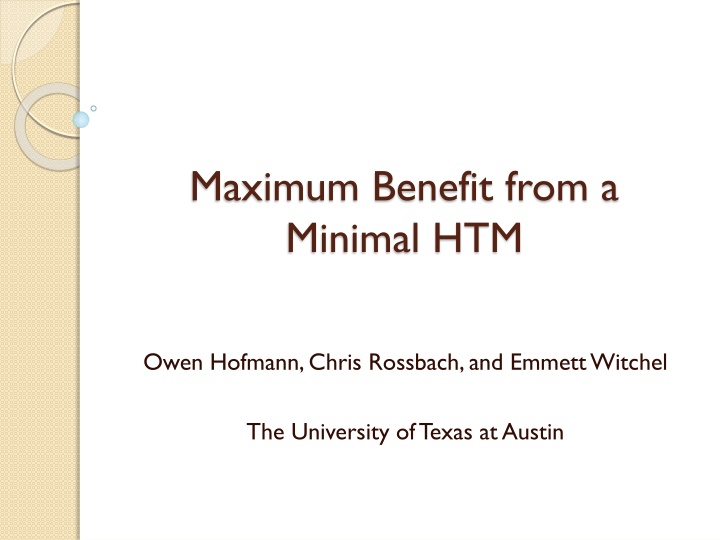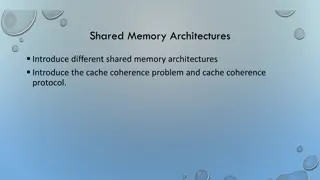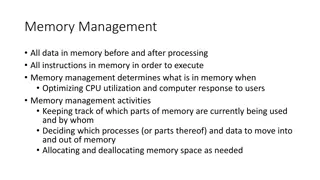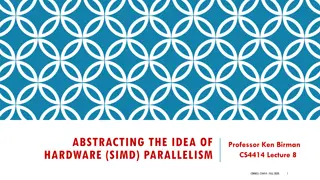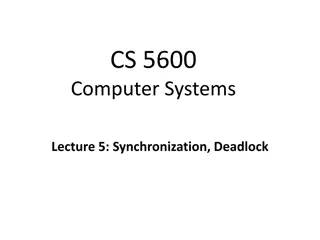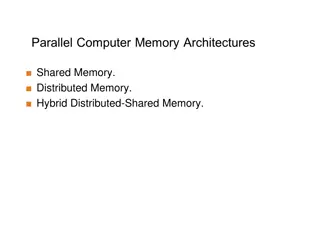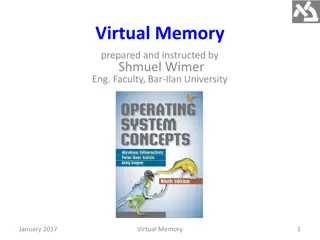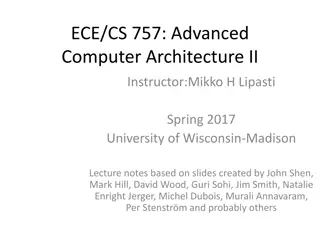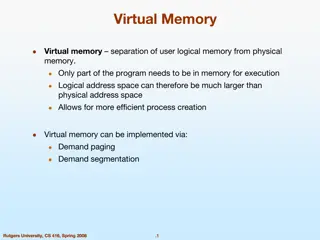Simplifying Parallelism with Transactional Memory
Concurrency is advancing rapidly, making parallel programming challenging with synchronization complexities. Transactional memory offers a solution by replacing locking with memory transactions, optimizing execution, and simplifying code for enhanced performance. Despite the challenges, transactional memory brings speed, scalability, and flexibility to the realm of parallelism.
Download Presentation

Please find below an Image/Link to download the presentation.
The content on the website is provided AS IS for your information and personal use only. It may not be sold, licensed, or shared on other websites without obtaining consent from the author.If you encounter any issues during the download, it is possible that the publisher has removed the file from their server.
You are allowed to download the files provided on this website for personal or commercial use, subject to the condition that they are used lawfully. All files are the property of their respective owners.
The content on the website is provided AS IS for your information and personal use only. It may not be sold, licensed, or shared on other websites without obtaining consent from the author.
E N D
Presentation Transcript
Maximum Benefit from a Minimal HTM Owen Hofmann, Chris Rossbach, and Emmett Witchel The University of Texas at Austin
Concurrency is here Core count ever increasing Parallel programming is difficult Synchronization perilous Performance/complexity Many ideas for simpler parallelism TM, Galois, MapReduce AMD Athlon X2 6400+ is a dual core processor 2 core 16 core 80 core
Transactional memory Better performance from simple code Change performance/complexity tradeoff Replace locking with memory transactions Optimistically execute in parallel Track read/write sets, roll back on conflict WA (RB WB) != Commit successful changes
TM ain't easy TM must be fast Lose benefits of concurrency TM must be unbounded Keeping within size not easy programming model TM must be realizable Implementing TM an important first step
TM ain't easy Fast Realizable Unbounded Best-effort HTM Version and detect conflicts with existing structures Cache coherence, store buffer
TM ain't easy Fast Realizable Unbounded Best-effort HTM Version and detect conflicts with existing structures Cache coherence, store buffer Simple modifications to processor Very realizable (stay tuned for Sun Rock)
TM ain't easy Fast Realizable Unbounded Best-effort HTM Version and detect conflicts with existing structures Cache coherence, store buffer Simple modifications to processor Very realizable (stay tuned for Sun Rock) Resource-limited Cache size/associativity, store buffer size
TM ain't easy Fast Realizable Unbounded Best-effort HTM STM Software endlessly flexible Transaction size limited only by virtual memory Slow Instrument most memory references
TM ain't easy Fast Realizable Unbounded Best-effort HTM STM Unbounded HTM Versioning unbounded data in hardware is difficult Unlikely to be implemented
TM ain't easy Fast Realizable Unbounded Best-effort HTM STM Unbounded HTM ~ ~ Hybrid TM Tight marriage of hardware and software Disadvantages of both?
Back to basics Fast Realizable Unbounded Best-effort HTM Cache-based HTM Speculative updates in L1 Augment cache line with transactional state Detect conflicts via cache coherence Operations outside transactions can conflict Asymmetric conflict Detected and handled in strong isolation
Back to basics Fast Realizable Unbounded Best-effort HTM Transactions bounded by cache Overflow because of size or associativity Restart, return reason Not all operations supported Transactions cannot perform I/O
Back to basics Fast Realizable Unbounded Best-effort HTM Transactions bounded by cache Software finds another way Not all operations supported Software finds another way
Maximum benefit Fast Realizable Unbounded Best-effort HTM Creative software and ISA makes best-effort unbounded TxLinux Better performance from simpler synchronization Transaction ordering Make best-effort unbounded
Linux: HTM proving ground Large, complex application(s) With different synchronization Jan. 2001: Linux 2.4 5 types of synchronization ~8,000 dynamic spinlocks Heavy use of Big Kernel Lock Dec. 2003: Linux 2.6 8 types of synchronization ~640,000 dynamic spinlocks Restricted Big Kernel Lock use
Linux: HTM proving ground Large, complex application With evolutionary snapshots Linux 2.4 Simple, coarse synchronization Linux 2.6 Complex, fine-grained synchronization
Linux: HTM proving ground Modified Andrew Benchmark
Linux: HTM proving ground Modified Andrew Benchmark
HTM can help 2.4 Software must back up hardware Use locks acquire_lock(lock) Cooperative transactional primitives Replace locking function Execute speculatively, concurrently in HTM Tolerate overflow, I/O Restart, (fairly) use locking if necessary release_lock(lock)
HTM can help 2.4 Software must back up hardware Use locks cx_begin(lock) Cooperative transactional primitives Replace locking function Execute speculatively, concurrently in HTM Tolerate overflow, I/O Restart, (fairly) use locking if necessary cx_end(lock)
HTM can help 2.4 Software must back up hardware Use locks cx_begin(lock) TX A Cooperative transactional primitives Replace locking function Execute speculatively, concurrently in HTM Tolerate overflow, I/O Restart, (fairly) use locking if necessary TX B cx_end(lock)
HTM can help 2.4 Software must back up hardware Use locks cx_begin(lock) TX A Cooperative transactional primitives Replace locking function Execute speculatively, concurrently in HTM Tolerate overflow, I/O Restart, (fairly) use locking if necessary do_IO() TX B cx_end(lock)
HTM can help 2.4 Locking B Software must back up hardware Use locks cx_begin(lock) TX A Cooperative transactional primitives Replace locking function Execute speculatively, concurrently in HTM Tolerate overflow, I/O Restart, (fairly) use locking if necessary cx_end(lock)
HTM can help 2.4 Locking B Software must back up hardware Use locks cx_begin(lock) Cooperative transactional primitives Replace locking function Execute speculatively, concurrently in HTM Tolerate overflow, I/O Restart, (fairly) use locking if necessary TX A cx_end(lock)
Adding HTM Spinlocks: good fit for best-effort transactions Short, performance-critical synchronization cxspinlocks (SOSP '07) 2.4 needs cooperative transactional mutexes Must support blocking Complicated interactions with BKL cxmutex Must modify wakeup behavior
Adding HTM, cont. cx_begin(lock) Reorganize data structures Linked lists Shared counters ~120 lines of code Atomic lock acquire Record locks Acquire in transaction Commit changes Linux 2.4 TxLinux 2.4 Change synchronization, not use stat++ TX B cx_end(lock)
Adding HTM, cont. cx_begin(lock) Reorganize data structures Linked lists Shared counters ~120 lines of code Atomic lock acquire Record locks Acquire in transaction Commit changes Linux 2.4 TxLinux 2.4 Change synchronization, not use stat[CPU]++ TX B cx_end(lock)
Adding HTM, cont. cx_begin(lock) Reorganize data structures Linked lists Shared counters ~120 lines of code Atomic lock acquire Record locks Acquire in transaction Commit changes Linux 2.4 TxLinux 2.4 Change synchronization, not use TX B do_IO() cx_end(lock)
Adding HTM, cont. cx_begin(lock) Reorganize data structures Linked lists Shared counters ~120 lines of code Atomic lock acquire Record locks Acquire in transaction Commit changes Linux 2.4 TxLinux 2.4 Change synchronization, not use acquire_locks() TX B do_IO() cx_end(lock)
Adding HTM, cont. cx_begin(lock) Reorganize data structures Linked lists Shared counters ~120 lines of code Atomic lock acquire Record locks Acquire in transaction Commit changes Linux 2.4 TxLinux 2.4 Change synchronization, not use do_IO() do_IO() Locking B cx_end(lock)
Evaluating TxLinux MAB Modified Andrew Benchmark dpunish Stress dcache synchronization find Parallel find + grep config Parallel software package configure pmake Parallel make
Evaluation: MAB 2.4 wastes 63% kernel time synchronizing
Evaluation: dpunish 2.4 wastes 57% kernel time synchronizing
Evaluation: config 2.4 wastes 30% kernel time synchronizing
From kernel to user Best-effort HTM means simpler locking code Good programming model for kernel Fall back on locking when necessary Still permits concurrency HTM promises transactions Good model for user Need software synchronization fallback Don t want to expose to user Want concurrency
Software, save me! HTM falls back on software transactions Global lock STM Concurrency Conflict detection HTM workset in cache STM workset in memory Global lock no workset Communicate between disjoint SW and HW No shared data structures
Hardware, save me! HTM has strong isolation Detect conflicts with software Restart hardware transaction Only if hardware already has value in read/write set Transaction ordering Commit protocol for hardware Wait for concurrent software TX Resolve inconsistencies Hardware/OS contains bad side effects
Transaction ordering char* r int idx
Transaction ordering char* r int idx Transaction A Transaction B begin_transaction() begin_transaction() r = new_array r[idx] = 0xFF idx = new_idx end_transaction() end_transaction() Invariant: idx is valid for r
Transaction ordering char* r int idx Transaction A Transaction B begin_transaction() begin_transaction() r = new_array r[idx] = 0xFF idx = new_idx end_transaction() end_transaction() Invariant: idx is valid for r Inconsistent read causes bad data write
Transaction ordering A(HW) read: write: r=new_array idx=new_idx r = old_array idx = old_idx time B(HW) read: write: r[idx] = 0xFF
Transaction ordering A(HW) read: write: r r=new_array idx=new_idx r = new_array idx = old_idx time B(HW) read: write: r[idx] = 0xFF
Transaction ordering A(HW) read: write: r r=new_array idx=new_idx r = new_array Conflict! idx = old_idx time B(HW) read: r write: r[idx] = 0xFF
Transaction ordering A(HW) read: write: r r=new_array idx=new_idx r = new_array idx = old_idx time B(HW) read: write: r[idx] = 0xFF Restart
Transaction ordering A(HW) read: write: r=new_array idx=new_idx r = old_array idx = old_idx time B(HW) read: write: r[idx] = 0xFF
Transaction ordering A(SW) r=new_array idx=new_idx r = old_array idx = old_idx time B(HW) read: write: r[idx] = 0xFF
Transaction ordering A(SW) r=new_array idx=new_idx r = new_array idx = old_idx time B(HW) read: write: r[idx] = 0xFF
Transaction ordering A(SW) r=new_array idx=new_idx r = new_array Conflict not detected idx = old_idx time B(HW) read: r write: r[idx] = 0xFF
Transaction ordering A(SW) r=new_array idx=new_idx r = new_array idx = old_idx time B(HW) read: r, idx write: r[idx] r[idx] = 0xFF new_array[old_idx] = 0xFF
Transaction ordering A(SW) r=new_array idx=new_idx r = new_array idx = old_idx time r[idx] = 0xFFOh, no! B(HW) read: r, idx write: r[idx] new_array[old_idx] = 0xFF
